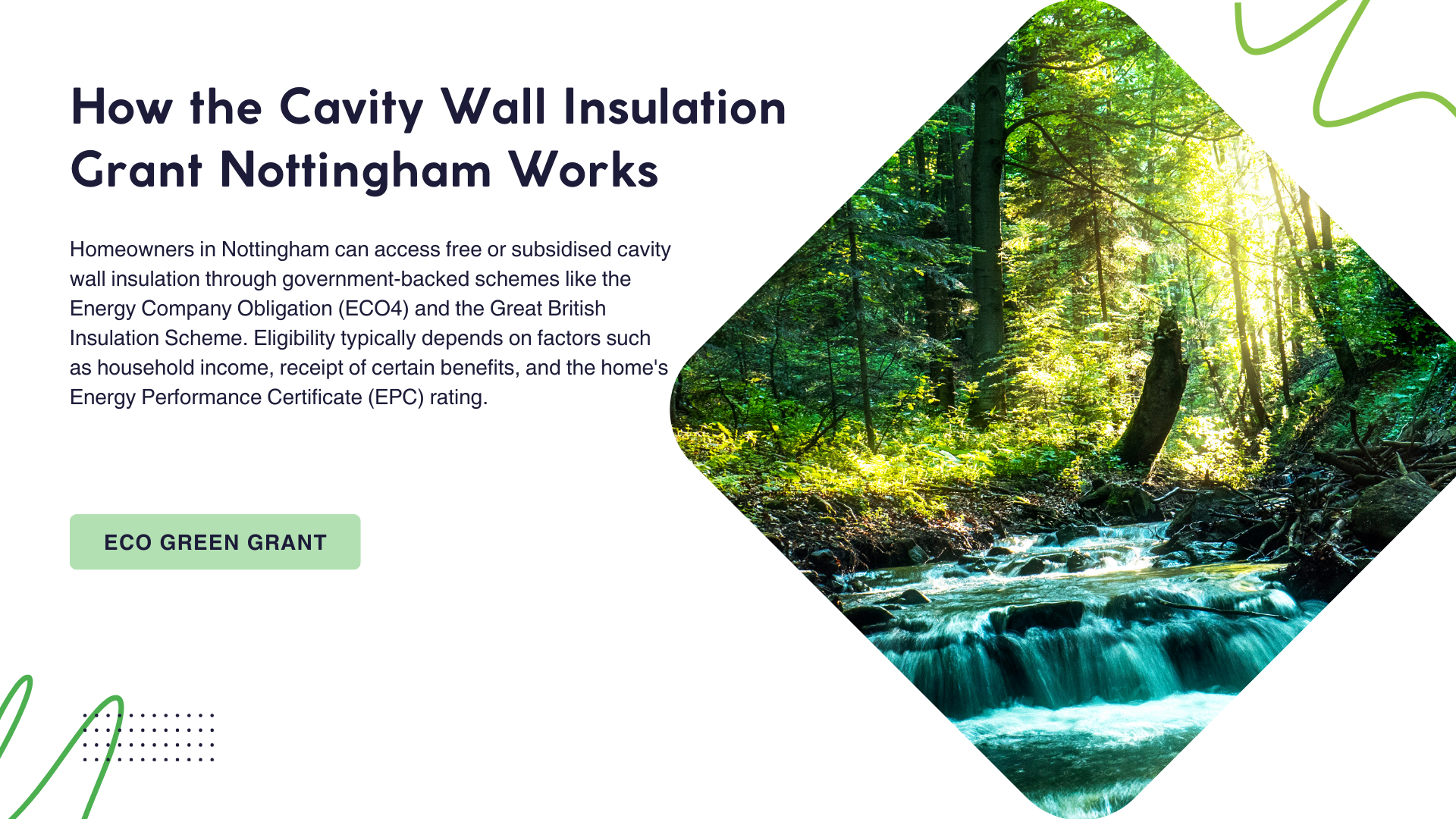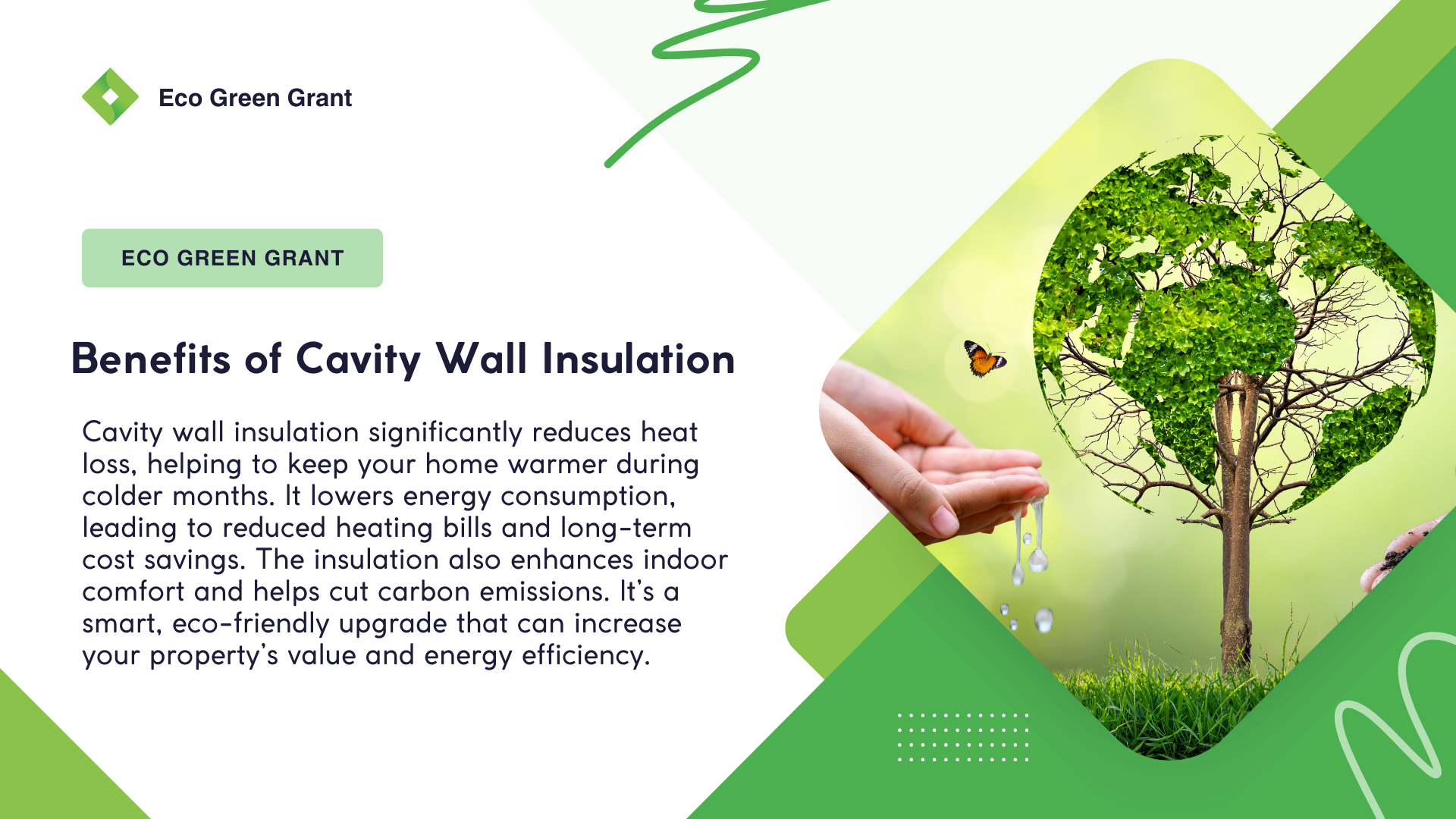If you live in Nottingham, you’ve probably heard about the cavity wall insulation grant Nottingham schemes helping local residents save money and energy. These grants, including support from the Eco Green Grant, make insulating your home’s walls easier and more affordable. Cavity wall insulation is one of the most effective ways to keep your home warm and reduce heating costs. This guide will walk you through everything you need to know about these grants and the insulation process.
What is Cavity Wall Insulation?

Understanding the Basics of Cavity Walls
Cavity walls consist of two layers of brick or block separated by a gap called the cavity. This gap was designed to prevent moisture from reaching the inside walls. However, without insulation, this cavity allows heat to escape, making your home less efficient. Filling this space with insulating material helps trap heat inside and reduces energy bills significantly.
How Does Cavity Wall Insulation Work?
Insulating the cavity involves pumping in materials like foam or mineral wool into the gap between the walls. These materials act as barriers that slow down the heat transfer from inside to outside. This means your heating system won’t need to work as hard, saving you money. The process is quick, usually taking just a day or two.
Why Nottingham Homes Benefit from Cavity Wall Insulation
Many homes in Nottingham, especially those built between the 1920s and 1980s, have cavity walls but lack insulation. This makes cavity wall insulation particularly effective in the city. Local weather can be cold and damp, so keeping heat in and moisture out improves home comfort and reduces fuel costs.
How the Cavity Wall Insulation Grant Nottingham Works

What Is the Eco Green Grant?
The Eco Green Grant is a Government-Backed Initiative aimed at helping homeowners improve energy efficiency. In Nottingham, this grant helps eligible residents install cavity wall insulation either for free or at a significantly reduced cost. The grant encourages sustainable living and lowers energy bills.
Who Can Apply for the Grant?
Eligibility usually targets low-income families, pensioners, or those receiving certain benefits. Many landlords and private homeowners in Nottingham qualify if their homes meet the criteria for cavity wall insulation. It’s best to check with local authorities or the Eco Green Grant website for specific requirements.
How to Apply and Get Approved
The application process involves contacting a registered installer or local council energy advice service. They will assess your property to confirm if cavity wall insulation is suitable and whether you qualify for a grant. Once approved, installation can be scheduled promptly, making the process hassle-free.
Benefits of Cavity Wall Insulation

Energy Savings and Cost Reduction
Cavity wall insulation can reduce heat loss through walls by up to 35%, translating into Lower Heating Bills. Many Nottingham residents save between £150 and £300 annually on energy costs after insulation. Over time, these savings make the initial investment highly worthwhile.
Enhanced Comfort and Warmth
By keeping warm air inside, cavity wall insulation makes rooms more comfortable, especially during chilly Nottingham winters. It also helps eliminate cold spots and draughts, creating a more pleasant living environment. Families often report improved overall home comfort.
Environmental Advantages
Reducing energy consumption also means lowering carbon emissions, helping combat climate change. Eco-friendly grants like the Eco Green Grant support Nottingham’s efforts to build greener communities. Every insulated home contributes to a cleaner, healthier environment.
Eligibility and Property Requirements
Who Qualifies for the Grant?
The grant mainly supports households with low incomes, pensioners, and people on certain welfare benefits. Nottingham City Council often partners with organizations to identify eligible applicants. This ensures that help reaches those who need it most, improving energy efficiency in vulnerable homes.
Suitable Properties for Insulation
Houses built from the 1920s to 1980s with uninsulated cavity walls are ideal candidates. The walls must have a cavity wide enough to accommodate insulation safely. Some older properties or those with solid walls won’t qualify, but there are alternative grants for those cases.
What About Rental Properties?
Tenants can benefit too, but typically only if landlords agree to the installation. Some landlords participate in grant schemes to improve their property’s energy rating, which can attract better tenants and increase property value. Tenants in Nottingham should inquire about their options.
The Installation Process: What to Expect

Survey and Assessment
Before installation, a professional will survey your home to check cavity suitability and recommend the best insulation material. This step is crucial to ensure safety and effectiveness. Surveyors also look for any damp or structural issues that need addressing first.
How Installation Is Done
Installers drill small holes in the External Walls and inject insulation material into the cavity. Once the cavity is filled, they seal the holes and clean up. The process usually takes just one or two days and requires minimal disruption to your daily life.
After Installation Care
Once installed, cavity wall insulation requires little to no maintenance. You might notice immediate improvements in warmth, but it can take a few days for full effects. Keeping an eye on any dampness or cracks ensures your insulation continues working well over time.
Common Concerns and Myths About Cavity Wall Insulation

Will Insulation Cause Damp or Mould?
When installed correctly by qualified professionals, cavity wall insulation does not cause damp or mould. The insulation materials used are breathable and designed to prevent moisture buildup. Proper wall ventilation and professional installation eliminate these risks.
Is the Installation Process Disruptive?
Many worry that installation will disrupt their lives. The good news is that cavity wall insulation is quick and mostly noise-free. Most homeowners find the process easy to accommodate with minimal inconvenience or mess.
Can All Homes Be Insulated?
Not every home has a suitable cavity for insulation. Some older or solid wall homes might not qualify, but other insulation options may exist for them. A professional survey is the best way to determine if cavity wall insulation is right for your Nottingham home.
Maximizing the Benefits of Your Cavity Wall Insulation
Combine Insulation with Other Energy Improvements
For the best results, pair cavity wall insulation with loft insulation, double glazing, or Efficient Heating Systems. This holistic approach maximizes energy savings and comfort in your home. Many Nottingham homeowners report greater bill reductions with multiple upgrades.
Take Advantage of Local Grants and Support
Besides the Eco Green Grant, other Nottingham schemes might be available. Always explore all your options and check local council websites regularly. Early applications often get priority, so act quickly to secure financial support.
Monitor Your Home’s Energy Usage
After installation, keep track of your energy consumption. Using smart meters or energy apps can help you spot savings and adjust heating habits. Being energy-conscious complements insulation efforts and reduces bills further.
Real-Life Stories From Nottingham Residents
Mrs. Taylor’s Warm Home in Radford
Mrs. Taylor used the cavity wall insulation grant Nottingham to insulate her 1950s home. She noticed her heating bills drop by nearly £200 annually and said her living room felt “cosier than ever.” She praised the Eco Green Grant for making the process affordable and easy.
Mr. Singh’s Rental Property Upgrade in The Meadows
Mr. Singh, a landlord, improved his rental property by installing cavity wall insulation with grant help. This made the flat more attractive to tenants and helped him meet new energy efficiency regulations. His tenants also reported warmer rooms and lower bills.
Tips From Neighbors in Beeston
Residents in Beeston recommend applying early and choosing installers approved by Eco Green Grant. They advise getting a full energy assessment to explore other possible savings. Their collective experiences show how simple insulation can improve Nottingham homes.
How to Apply for the Cavity Wall Insulation Grant Nottingham
Finding Local Approved Installers
Start by looking for installers registered with government or Eco Green Grant schemes. These professionals will guide you through eligibility checks and handle the application process. Choosing the right installer ensures quality work and valid grants.
Preparing Your Application
Gather proof of income, benefits, or ownership documents to speed up your grant application. Having this paperwork ready helps installers or councils assess your eligibility faster. Most applications can be started online or by phone.
What Happens After Approval?
Once approved, installation dates are arranged. The whole process, from application to completion, can take a few weeks depending on demand. After installation, keep any paperwork safe for future reference or warranty claims.
FAQs
What is cavity wall insulation?
Cavity wall insulation fills the gap between the two walls of a property with insulating material. This prevents heat from escaping, keeping your home warmer and reducing energy bills. It’s a quick and effective way to improve home efficiency, especially in homes built between the 1920s and 1980s.
Who is eligible for the cavity wall insulation grant in Nottingham?
Eligibility often includes low-income households, pensioners, and people on certain benefits. Some landlords and private homeowners also qualify if their property has uninsulated cavity walls. Checking with local councils or the Eco Green Grant program will clarify if you can apply.
How does the Eco Green Grant support cavity wall insulation?
The Eco Green Grant helps Nottingham residents by covering all or part of the installation cost of cavity wall insulation. This makes it affordable for many households who might otherwise struggle with upfront expenses, encouraging energy-efficient home improvements.
How long does cavity wall insulation installation take?
Installation usually takes one or two days and causes minimal disruption. Installers drill small holes in the external walls, fill the cavity with insulation, then seal the holes. Most homeowners can stay in their homes throughout the process.
Can cavity wall insulation cause damp or mould?
No, when installed by certified professionals using the right materials, cavity wall insulation does not cause damp or mould. The insulation is breathable and designed to prevent moisture build-up, maintaining the health of your walls.
Is cavity wall insulation suitable for all homes?
Not all homes qualify, especially those without cavity walls or with very narrow cavities. Older homes with solid walls typically need different insulation solutions. A professional survey can determine if your home is suitable for cavity wall insulation.
How much money can I save with cavity wall insulation?
Many Nottingham homeowners save between £150 and £300 annually on heating bills after insulating cavity walls. These savings add up over time, helping to offset installation costs and reduce overall energy consumption.
Can tenants benefit from cavity wall insulation grants?
Tenants can benefit if their landlord agrees to install insulation. Some landlords take advantage of grants to improve their properties’ energy efficiency, which can lower tenants’ bills and make homes more comfortable.
What should I do to prepare for cavity wall insulation?
Before installation, clear furniture away from walls and ensure easy access to external walls. Installers will handle the rest, including drilling small holes and injecting insulation. Preparing helps the process go smoothly and quickly.
How do I find a reliable installer for cavity wall insulation in Nottingham?
Look for installers registered with government-backed schemes like the Eco Green Grant. Checking customer reviews and certifications ensures quality work. A reputable installer will also assist with grant applications and home surveys.






